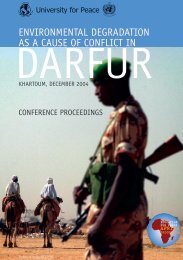who medicines strategy - libdoc.who.int - World Health Organization
who medicines strategy - libdoc.who.int - World Health Organization
who medicines strategy - libdoc.who.int - World Health Organization
Create successful ePaper yourself
Turn your PDF publications into a flip-book with our unique Google optimized e-Paper software.
WHO MEDICINES STRATEGY 2004-2007 | 40Figure 6:National recognition of the right to health Source: Kinney ED, “The International Human Right to <strong>Health</strong>:What Does This Mean for our Nation and <strong>World</strong>?” in IndianaLaw Review, Vol 34, 2001, page 1465.EO 1.7Access to essential <strong>medicines</strong>recognized as a human right viaadvocacy and policy guidance torecognize and monitor access toessential <strong>medicines</strong> as part of theright to healthRationaleThe right to health is referred to in the openingparagraph of the WHO Constitution. It has alsobeen recognized in many global and regionalhuman rights treaties, such as the InternationalCovenant on Economic, Social and Cultural Rights(ICESCR) which has been signed by over 140countries. In the authoritative General CommentNo.14 (2000) by the Committee on Economic,Social and Cultural Rights, the right to healthfacilities, goods, and services in article 12.2.(d) ofthe Covenant is understood to include, <strong>int</strong>er alia,the appropriate treatment of prevalent diseases,preferably at community level, and the provisionof essential drugs as defined by WHO. While theCovenant provides for progressive realization andacknowledges the limits of available resources,State parties have an immediate obligation toguarantee that the right to health will be exercisedwithout discrimination of any kind, and to takedeliberate and concrete steps towards its fullrealization.ProgressAll countries in the world have signed at leastone of the <strong>int</strong>ernational treaties that confirm theright to health as a human right (Figure 6); and109 countries have included the right to healthin their constitution. In an increasing number ofcountries, especially in Latin America but also inThailand and South Africa, individuals or NGOshave initiated and won constitutional court cases,demanding from their government the equitablerealization of the right to health — for example,winning universal access to certain types ofessential <strong>medicines</strong>.Within the UN system, a Special Rapporteuron the Right to <strong>Health</strong> was appo<strong>int</strong>ed in 2001.The Special Rapporteur is working in closecollaboration with WHO, with the aim ofincluding regular reporting on equitable access toessential <strong>medicines</strong> as part of the obligatory fiveyearreporting by State parties to the InternationalCovenant.











